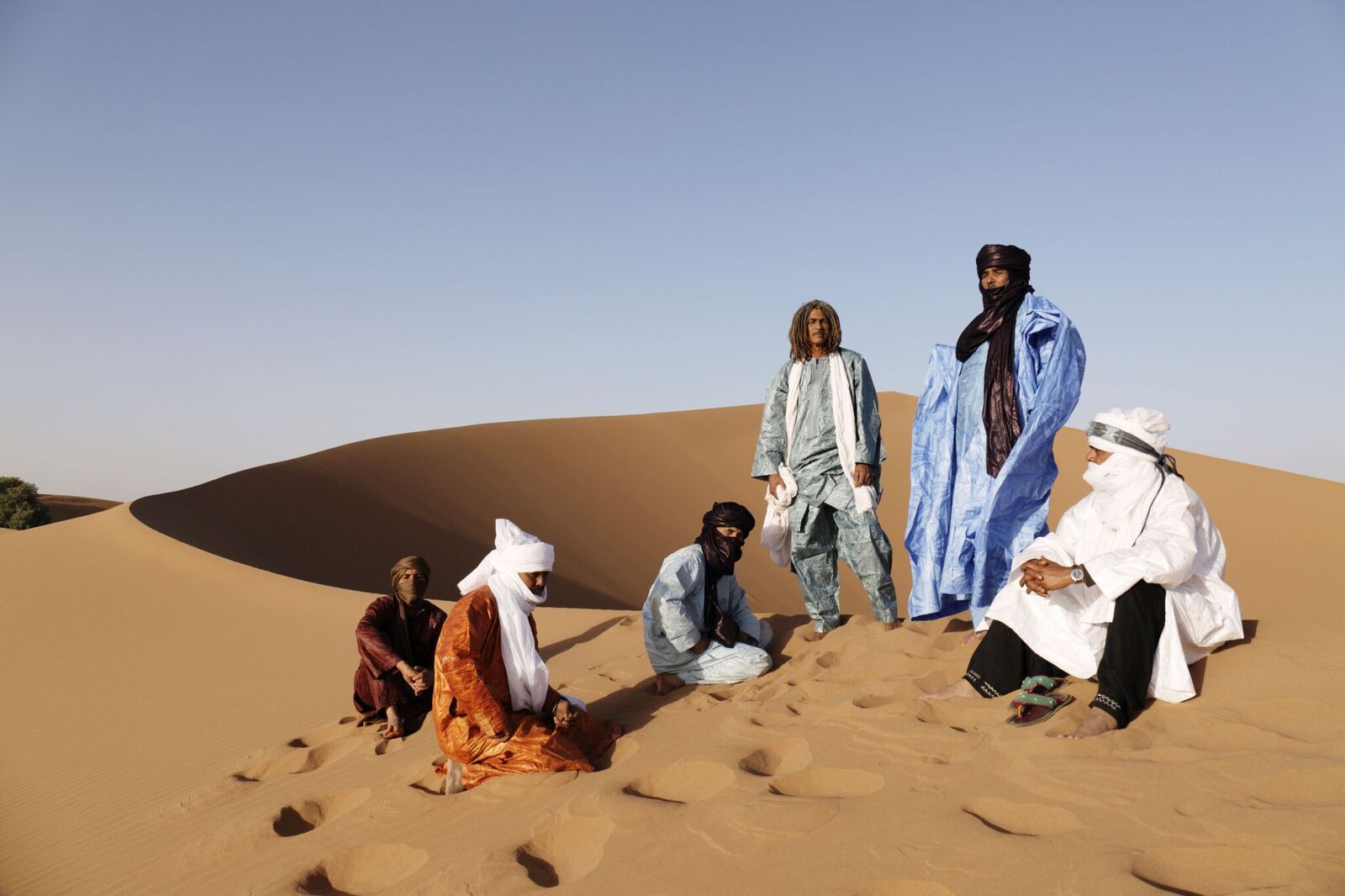
In 1990, a lawyer named Craig Ferguson found himself in a hotel room in Chicago dreaming of a new phase of his life, one where he would bring together songwriters from around the world for a “summit on the song.” The next year he brought the idea to life with the first Rocky Mountain Folks Festival. Subsequent years, though fraught with problems in those early days, drew more than 1,000 people to watch lineups including Celtic, Canadian, reggae, jazz and Russian folk acts.
In creating a teaser for this year’s Rocky Mountain Folks Festival — the 28th — we wanted to highlight Craig’s initial dream by profiling a few of the genre-blending, polyglottic, international bands on this year’s lineup.
Folk music is the language of the people, one that transcends place and time and mother tongue. In these divisive times here in the U.S., Folks Fest is an opportunity to remember there is no “other,” there is only “us,” humanity, together as one, singing to the heartbeat of our Mother Earth.
Our coverage brings you stories from the Sahara Desert, from the concrete jungle of Los Angeles and from “la belle province,” Québec, Canada. In French, Spanish, Tamashek and English, these bands tap into the deep well of humanity to tell stories that circumvent the language barrier to speak directly to the heart.
We hope the following stories will guide you up to Planet Bluegrass this year, where there are plenty more stories to hear and tell.
On the Bill: Rocky Mountain Folks Festival. Aug.17-19, Planet Bluegrass, 500 W. Main St., Lyons, bluegrass.com/folks.
Tinariwen
Sounds of the Sahara
by Angela K. Evans
Some call it desert blues. Others call it West African rock. According to the Recording Academy, it’s World Music. In reality, the music of Tinariwen is a sound all its own. Focused around electric and acoustic guitars, it’s kept in rhythm with an electric bass and local percussion instruments like the tindé drum. The poetic lyrics are often repetitive, sometimes sung by a soloist, but mostly through a rich harmony of voices. They’re hypnotic, especially to Western ears unaccustomed to the band’s native Tamashek language.
The band is Tuareg, a nomadic group of about 2 million people that transcend national boundaries, spread throughout Mali, Niger, Libya, southern Algeria and Chad in North Africa. For decades, Tinariwen has used music to share the Tuareg culture and plight with the rest of the world.
“We are a small people facing many difficulties because of extremism, globalization and climate change, so we use our exposition to speak out for all the Tuareg people,” guitarist and singer Abdallah Ag Alhousseini says via an email translation.

The band was born out of political struggle and has known violence almost their entire lives. As a young boy, Tinariwen’s leader, Ibrahim Ag Alhabib, lost his father, who was executed for helping Tuarag rebels in the newly independent Mali. In the early 1980s the group met in exile, recruited into military training camps by Libyan leader Muammar al-Gaddafi. They connected over music, sitting around campfires and developing their signature sound. Their first shows were weddings and other traditional gatherings, Alhousseini says, a long ways away from the large festival stages they now play.
Later, they were part of the Tuareg rebellion in 1990s that led to a peace agreement and the band’s return to Mali. But the region has faced increasing political unrest and extremism in recent years, and with it has come a religious war against music, threatening local culture and cohesion. In 2013, one member of Tinariwen was kidnapped by Islamists and held for 10 days.
Despite the Tuareg’s continued struggle for a homeland, or at least political representation, Tinariwen continues to play and record music — winning a Grammy for Best World Music Album in 2011 and another nod in 2017. “As people who have experienced life with violence, we are even more convinced that music is a much better answer,” Alhousseini says. “Things don’t get any better with violence.”
Their latest release, Elwan, is again set to the backdrop of the Sahara Desert — the sandy dunes, the winds that mold and shape them, the stars that illuminate the night sky. They call their people back to the solitude and power of the natural world; they promise the desert they will always return.
“We have chosen music and poetry to promote human freedom and development,” Alhousseini says. “Humanism is our philosophy.”
Tinariwen’s music has a universal appeal that reaches beyond their desert homeland and speaks of a unity that applies to all people, regardless of nationality, ethnicity or culture.
Tinariwen plays at 5 p.m. on Sunday, Aug. 19.
Las Cafeteras
East L.A. Chicano folk fusion
by Caitlin Rockett
If you’ve got a little Spanish in your back pocket, you might think Las Cafeteras is a band of all women, what with that “a” there on the end. But the Chicano band from East L.A. is a mixed-company outfit. The “misspelling,” as it were, is the band’s way of snubbing grammatical gender, a hard “no thanks” to the Spanish language’s predilection for the masculine; acceptance, says vocalist Daniel French, of the feminine energy that exists in us all.
“That’s who we are as humans,” French says. “We have this balance of energy in us.”
The band got its start nearly 15 years ago at the Eastside Café, a community cultural center in El Sereno, Los Angeles, where, instead of coffee, patrons serve up knowledge in an each-one-teach-one style.
“[It was] founded on the idea that you don’t need the government,” French says of the café. “We don’t need to wait for somebody else to come do things for us.”
French says his friend and future bandmate, Hector Flores, asked a fellow patron at the café to teach classes in son jarocho, a regional folk music style from Veracruz, Mexico.
The patron was game, but there was one stipulation.
“She said, ‘You can’t tell me no, meaning I’m going to have you dancing, singing, playing, and you can’t say no to any of those.’”

So they didn’t say no, learning to play instruments central to the son jarocho Afro-Mexican folk style, such as the jarana (an eight-stringed tiny guitar), requinto (a smaller version of a classical guitar), quijada (jawbone) and tarima (a wooden platform used for dancing and percussion). They called themselves Las Cafeteras — the coffeemakers — after the “café” that brought them all together.
Over the years the band has changed a lot, morphing from a group of dozens of musicians into a core group of just six. They’ve taken many traditional son jarocho songs and modernized them, replacing Spanish colonial era lyrics about sailors and cattle with contemporary tales of being an immigrant in the concrete jungle of Los Angeles. There are notes of rock, hip-hop, punk, cumbia and rancheras woven in and out of the foundational folk sounds.
“What some people consider folk is often too narrow,” French says. “It’s the music of the people.
“People from around the world will continue to mix traditions across tribes, from people down the river and up the river, but now also from around the world,” he says. “You hear it everywhere. Like in [the] Black Panther [soundtrack]. I think the composer is Swedish (Ludwig Göransson), but Kendrick Lamar was also working on that soundtrack. There’s a mix of African, hip-hop, trap, violins…”
The future of folk music, French says, lies at this indistinguishable intersection between the past and the future, the place where old and young meet, where ideas shift and progress marches forward.
“It’s about community,” French says. “In that way folk music goes beyond the artist, so to speak, beyond the person making the noise, to the community that gathers to do something together. I think that’s where we all meet with folk music. To pass time, yes, but also to move into the future through the past, or to move into the past as we walk together into the future. There’s a magic to that. Time isn’t linear. It’s circular. It’s woven together.”
Las Cafeteras play at 5:30 p.m. on Friday, Aug. 17.
Les Poules à Colin
Chansons folklorique Québécoises
by Caitlin Rockett
With four women and one Colin, it seems pretty clear why Quebéc-quintet Les Poules à Colin settled on their name: “Colin’s hens.”
But like the young band’s music, their name has layers, more enchanting and nuanced than one might believe possible from a group of college-aged musicians.
“La Poule à Colin” is a well-known chanson folklorique Québécoises, a traditional folksong from Quebéc, about a hen that gets lost in a neighboring yard and, in a very biblical way, manages to become a meal that feeds an entire parish. The priest of the parish is so enraptured by the meal that he forgets to say mass to the town’s people who so desperately “need” to hear it.
Les Poules à Colin seem to share that chicken’s magical ability to feed and beguile the masses, their songs hearty fare for the ravenous musical explorer. Their modern interpretations of traditional Québécois songs incorporate hints of Celtic composition and flourishes of contemporary jazz, glued together with impossibly smooth harmonies, almost exclusively sung in French.
For Les Poules, singing in French is an act of preservation.
“Where we’re from in Quebec there’s still a lot of tension between the English language and French,” says lead singer and violinist Béatrix Méthé. “We’re encouraged from a young age to play music and sing in French and preserve that part of our culture that some are afraid is going to die.”

Often driven along by Colin’s clogging feat — a galloping rhythm known as podorythmie that’s a common feature in Québécois folk music — Les Poules puts a signature touch on the irresistibly whimsical and sometimes noir storylines of many beloved Québécois songs.
The five musicians grew up together on the folk scene in Quebéc, honing their craft at house parties with some of Quebéc’s finest folk musicians — which included their parents. Long before the five were even born, their parents played in bands together. There was a special kind of musical chemistry built into their DNA, says Méthé. After nine years and three full-length albums, the group has traveled through North America, Europe and Australia.
“People seem to be very open and interested in a culture that is, I guess, foreign for them,” Méthé says. “When we tour, we are considered in the world music category and people don’t seem to care at all about the language. But our music isn’t exclusively focused on lyrics.”
It’s true: there’s no need to speak French to find yourself spellbound by Les Poules’ songs, but the beauty of the music begs you to investigate the yarn Méthé weaves with her velveteen vocals.
The band’s newest release, Morose, explores the dark corners of folk music.
“We’ve been in the traditional world of Québécois music since we were really young,” Méthé says. “If you take the time to listen to a lot of these songs they are really dark: people being too drunk to take care of their kids, jealousy, strange dark subjects that are forgotten because they are played in an upbeat tempo and they are really fun. We thought it would be interesting to dig up some of these old songs, embrace that darkness.”
Les Poules à Colin play at 2 p.m. on Saturday, Aug. 18.
The Milk Carton Kids
Mourning through music
by Sara McCrea
Though the two had met only three months before, long after the invitations had been sent, Kenneth Pattengale sat at the family table for Joey Ryan’s wedding. It seemed fitting, as the duo’s connection seemed to Pattengale like musical love at first sight. Now, eight years and four albums later, Pattengale describes the pair’s relationship as folk duo The Milk Carton Kids a lot like a marriage.
“It was so apparent from the start, and what’s transpired over the past eight years is every emotion and experience under the sun, including lots of frustration with each other and lots of real success and happiness with each other,” Pattengale says. “It’s deep care and understanding of what we do together and an ambitious desire for what we can do together. It’s not unlike a real deep friendship or a serious relationship. There’s lots of compromise and often lots of tension, and of course, it has to be enduring, it has to be life-giving.”
The Milk Carton Kids released their most ambitious album yet, All the Things That I Did and All the Things That I Didn’t Do, in late June. On the album, the duo builds on their Simon and Garfunkel-esque heart-rending harmonies and intertwining guitar melodies by introducing additional instrumentation and bringing in a separate producer for the first time. With a mournful 10-minute song as its centerpiece and other tunes about personal and cultural loss, the album returns to the band’s career-spanning themes of grief, confusion and nostalgia.

Pattengale and Ryan begin the writing process separately, but quickly introduce the material to each other for feedback and revision. For All the Things, Pattengale says much of Ryan’s writing came from a place of concern as a new father in today’s cultural and political climate, while much of his own writing came from the end of a seven-year relationship and his journey to overcoming cancer in recent years.
“Both he and I have been writing our truths, whatever that is. That’s all you can really do anyways, when you write songs,” Pattengale says. Though they did not set out with an overarching narrative for their latest album, Pattengale sees each of the songs as vignettes that come together to reflect the duo’s experience as they undergo self-development, both together and individually.
The duo has played Folks Fest once before in 2012, just the two of them and their guitars. Back then they performed in the early afternoon, but this time they will be playing as the penultimate closers to the festival with a full band behind them.
“Folk is always, by definition, the stuff of the people. The way the music industry would like to have it is this other wave of Mumford and Sons and Old Crow Medicine Show, the rise of these Americana acts that they like to throw together and wrap up in a neat bow and in a nice little package,” Pattengale says.
“The important part is that there is something like Folks Festival, a place where people come together once a year. There’s a community that arises from that, both as musicians, who end up entertaining the people and playing the songs, but equally for the audience, who attends and celebrates them. Music is always a conversation between the people making it and the people listening to it.”
The Milk Carton Kids play at 6:45 p.m. on Sunday, Aug. 19.














